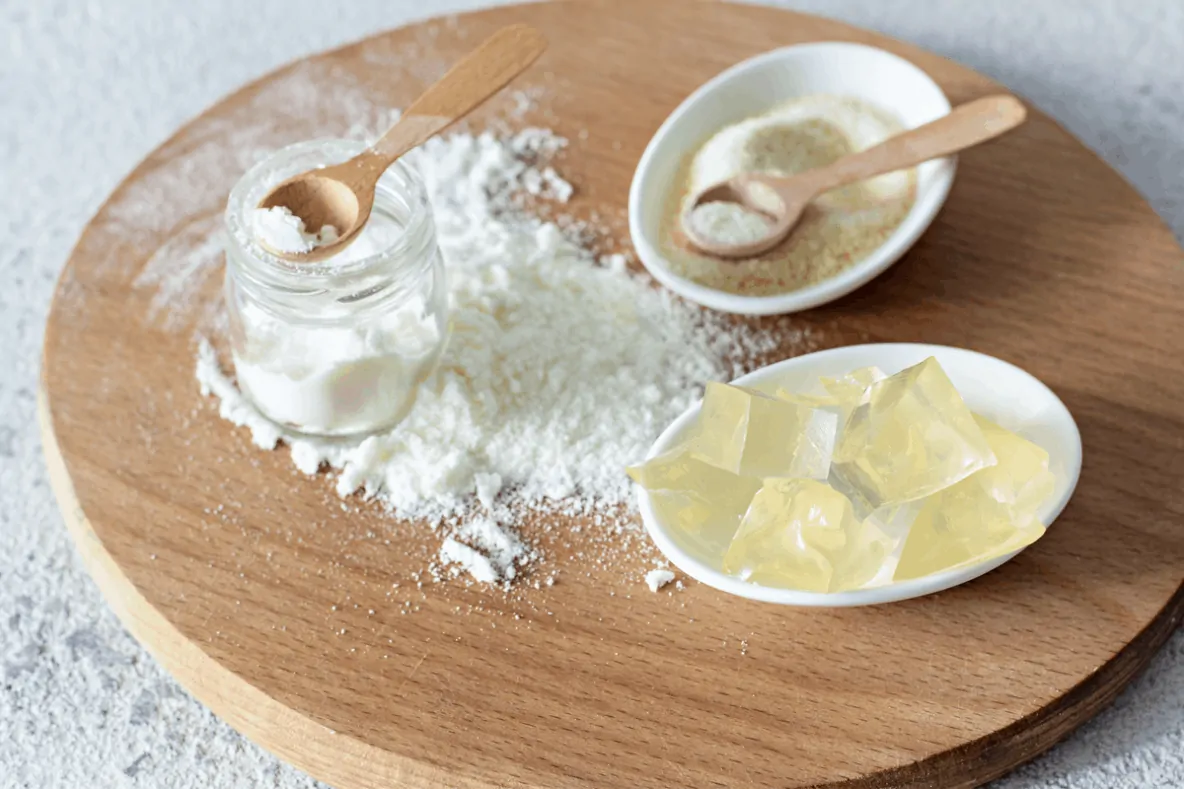For most people, any mention of gelatin takes their mind back to childhood and sweet jiggly desserts, candies, Jell-O, and marshmallows. However, there is more to gelatin than sweet desserts. Gelatin is a potent protein with multiple benefits.
Most of gelatin’s health benefits come from its unique amino acid profile, which contains anti-aging properties such as glycine, valine, and proline.
6 Potential Benefits of Gelatin
- Strengthens Joints
- Improves Bone Health
- Helps with Weight Loss
- Prevents Muscle Wasting
- Improves Sleep Quality
- Contains Anti-aging Properties
Gelatin is made by cooking collagen found in hooves, bones and the connective tissue of animals. Heat decomposes collagen’s long protein fibrils into small amino acid compounds that make up gelatin.
Unlike collagen, however, gelatin dissolves in warm water and forms a jelly-like texture when it cools. This property has made gelatin a common ingredient in the production of candy and Jell-O.
Gelatin can also be processed to produce hydrolyzed collagen. This process breaks down the amino acids in gelatin which makes collagen hydrolysate easier to digest.
Although both gelatin and hydrolyzed collagen have a similar nutrition profile, they have different chemical and physical properties. For instance, while gelatin dissolves in hot water and forms a gel-like substance on cooling, hydrolyzed collagen is soluble in hot and cold water and dissolves unnoticed.
Since our bodies cannot make enough gelatin, it’s better to obtain gelatin from foods such as bone broth. And because gelatin is a derivative of collagen, the most abundant protein in animals, gelatin is 98-99% protein.
This means that taking half a cup of gelatin will provide you with about 2 grams of protein. The remaining 1-2% of gelatin is made up of water and small amounts of minerals such as sodium and calcium. Although gelatin still lacks essential amino acids such as tryptophan, which makes it an incomplete protein, gelatin contains the following amino acids:
- Glycine – 27%
- Proline – 16%
- Valine – 14%
- Hydroxyproline – 14%
- Glutamic acid – 11%
Gelatin for Joint and Bone Health
Collagen is the most abundant protein in the body. Since collagen acts as a glue, it strengthens the tissues and ligaments, which play a vital role in ensuring our skeleton remains sturdy and flexible.
Research reported in the Journal of Agricultural and Food Chemistry shows that gelatin effectively treats joint and bone problems such as osteoarthritis and osteoporosis. Collagen is also vital in cartilage metabolism, which prevents the breakdown of bone collagen.
Taking gelatin supplements has been shown to reduce joint pain and stiffness in people with osteoarthritis significantly. This reduction in joint pain is aided by glycine and proline, whose anti-inflammatory properties are well documented.
On the other hand, lysine helps bones to heal faster after fractures. In addition, studies show that collagen hydrolysate makes joints more durable, making collagen hydrolysate ideal for athletes involved in long-distance running and heavy-lifting.
Gelatin and Muscle Growth
Researchers from the University of Southern California found that fabricating a gel scaffold from gelatin can be used in human muscle development and the treatment of severe skeletal muscle disorders.
However, research also shows that gelatin cannot be used alone to promote muscle growth since it is an incomplete protein and doesn’t have all the essential amino acids (including leucine) required for muscle growth.
Therefore, you need to include other protein sources such as dairy foods, soy foods, and vegetables to stimulate muscle hypertrophy. Since gelatin is made up of proteins, gelatin is almost carb and fat-free. Gelatin leads to a rise in appetite-reducing hormones in the body, which makes us feel full and helps with weight loss.
Side Effects and Safety
Gelatin is considered a safe supplement by the Federal Drug Administration (FDA). In some situations, however, gelatin can cause stomach upset and bloating.
Recommended Dosage
Research shows that 10 grams of gelatin per day for up to 6 months is safe.
Effectiveness of Gelatin
Due to its unique amino acid profile, gelatin is worth incorporating into your diet. You can try homemade bone broth from leftover bones, cartilage from grass-fed animals, or homemade sugar-free “Jell-O” gelatin.
You can also purchase powdered gelatin, which is colorless and flavorless, making it easy to add to food and drinks. While gelatin is not a good source of protein if you want to build strength and muscle, studies show that gelatin makes the joints in the body more durable.

